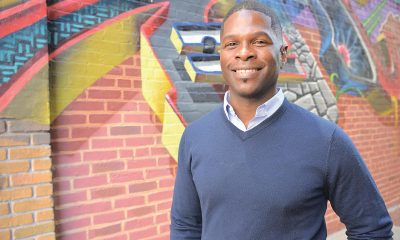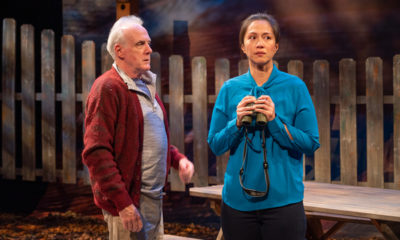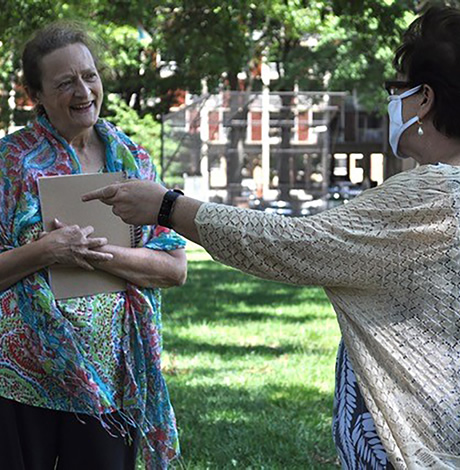Arts & Entertainment
The art of the matter
‘Old Masters’ presents intriguing theatrical dilemma
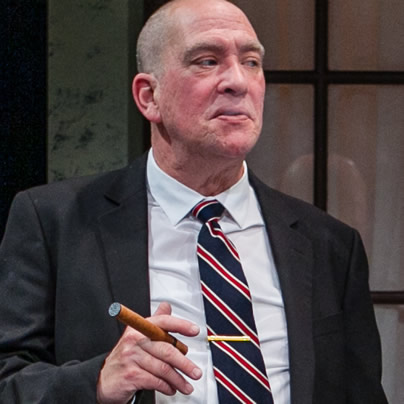
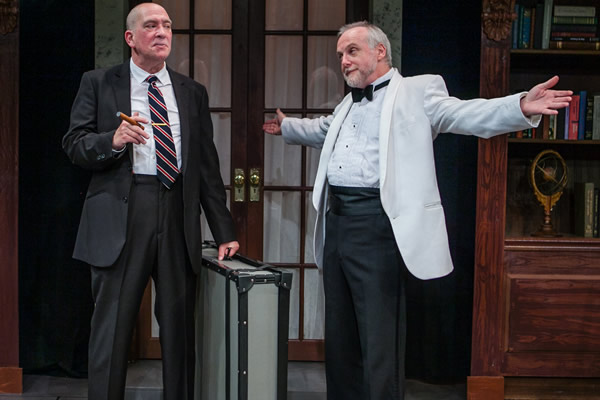
Conrad Feininger, left, as Sir Joseph Duveen and David Bryan Jackson as Bernard Berenson in Washington Stage Guild’s production of ‘The Old Masters.’ (Photo by C. Stanley Photography; courtesy WSG)
‘The Old Masters’
Through Jan. 26
Washington Stage Guild
Undercroft Theatre, 900 Massachusetts Avenue, N.W.
$40-$50 (half price student discount)
866-811-4111
Simon Gray’s thoroughly enjoyable drama “The Old Masters” is indeed about important art. It’s also about the art of the deal. But mostly it’s about the interdependent professional relationship (and sometimes friendship) between famed art historian Bernard Berenson and the equally famous art dealer Joseph Duveen.
Washington Stage Guild’s take on Gray’s 2004 work currently playing at the intimate Undercroft Theatre features a very capable cast in a production straightforwardly staged by Laura Giannarelli.
Set in the storied Villa I Tatti, Berenson’s residence near Florence, the action unfolds over one long evening in 1937. The scene is tense. A Lithuanian-born American, Berenson (BB to his friends) and his terminally ill wife Mary aren’t happy. Money is tight and war is looming. She is preoccupied with the financial wellbeing of her adult children and grandchildren from a previous marriage in England, and he misses the fat checks he once collected for authenticating Renaissance paintings. Yet a veneer of domestic civility prevails, thanks mainly to Nicky, Berenson’s longtime factotum and mistress (and now Mary’s caregiver).
On the fated night, Duveen drops in uninvited. He and BB have been on the outs, but Duveen softens the estrangement by paying an old debt to his host and proposing a lucrative business partnership. But first (and here’s the rub), Duveen wants a favor. He asks that BB pipe down on the authentication of a painting that he is selling to patrician American industrialist Andrew Mellon. BB says it’s a Titian. The world credits Masaccio. A great showdown ensues.
“The Master Works” is the last published play by British playwright Gray who died at 71 in 2008. Though not acquainted with his protagonists in life, he knows them well. Gray brilliantly conveys his aging characters’ urgency in terms of time and concern with legacy — both monetary and reputation. While an interest in art and a little background on the characters might prove helpful to audiences, it’s not necessary. This well-made play stands on its own.
Duveen is played with bigger-than-life gusto by Conrad Feininger. He envelops the smaller, less demonstrative BB (David Bryan Jackson) with roaring compliments and great hugs, bending his frenemy to his will with a tidal wave of bonhomie. It’s a wonderful performance.
And Jackson (wearing a neatly trimmed Van Dyke beard) gives a nuanced portrayal. His BB is a fastidious sensualist who falls into raptures when he sees “The Adoration of the Shepherds” (the painting in question). He’s a self-centered man who expects a lot of from his women (including his Swedish masseuse who visits daily) yet he cares for them deeply in his own way.
Jewel Robinson is compelling as Mary, BB’s wife who tolerates her husband’s weaknesses. Rounding out a very strong cast are Thomasin Savaiano as charming and efficient Nicky, and Steven Carpenter as Fowles, Duveen’s assistant derisively referred to as the “lift boy” by BB. (Fowles was once in fact the elevator operator in Duveen’s apartment building.)
Marianne Meadows gently lights set designer Carl F. Gudenius’ pretty Italian garden and later a well-appointed library. Sigrid Jóhannesdóttir’s costumes exude quality and taste except for those worn by Nicky, who’s a tad flashier than the others.
“The Old Masters” has great local resonance. “The Adoration of the Shepherds” hangs in Washington’s National Gallery, one of many Renaissance paintings collected Mellon, Samuel Kress (the five and dime millionaire), and others to be found in the building’s West Wing. While brush stroke technique and revered names like Titian are tossed about throughout much of the play, the audience sees only the backs of canvases. A visit to the Gallery might make a nice follow up.

Team DC, the umbrella organization for LGBTQ-friendly sports teams and leagues in the D.C. area, held its annual Night of Champions Awards Gala on Saturday, April 20 at the Hilton National Mall. The organization gave out scholarships to area LGBTQ student athletes as well as awards to the Different Drummers, Kelly Laczko of Duplex Diner, Stacy Smith of the Edmund Burke School, Bryan Frank of Triout, JC Adams of DCG Basketball and the DC Gay Flag Football League.
(Washington Blade photos by Michael Key)




















The 2024 National Cannabis Festival was held at the Fields at RFK Stadium on April 19-20.
(Washington Blade photos by Michael Key)
















Covering the @NatlCannaFest at RFK Stadium for @WashBlade . Stop by the LGBTQ+ booth and pick up a paper if you are here. pic.twitter.com/is7hnsaPns
— Michael Patrick Key (@MichaelKeyWB) April 20, 2024
Theater
‘Amm(i)gone’ explores family, queerness, and faith
A ‘fully autobiographical’ work from out artist Adil Mansoor

‘Amm(i)gone’
Thorough May 12
Woolly Mammoth Theatre
641 D St., N.W.
$60-$70
Woollymammoth.net
“Fully and utterly autobiographical.” That’s how Adil Mansoor describes “Amm(i)gone,” his one-man work currently playing at Woolly Mammoth Theatre.
Both created and performed by out artist Mansoor, it’s his story about inviting his Pakistani mother to translate Sophocles’s Greek tragedy “Antigone” into Urdu. Throughout the journey, there’s an exploration of family, queerness, and faith,as well as references to teachings from the Quran, and audio conversations with his Muslim mother.
Mansoor, 38, grew up in the suburbs of Chicago and is now based in Pittsburgh where he’s a busy theater maker. He’s also the founding member of Pittsburgh’s Hatch Arts Collective and the former artistic director of Dreams of Hope, an LGBTQ youth arts organization.
WASHINGTON BLADE: What spurred you to create “Amm(i)gone”?
ADIL MANSOOR: I was reading a translation of “Antigone” a few years back and found myself emotionally overwhelmed. A Theban princess buries her brother knowing it will cost her, her own life. It’s about a person for whom all aspirations are in the afterlife. And what does that do to the living when all of your hopes and dreams have to be reserved for the afterlife?
I found grant funding to pay my mom to do the translation. I wanted to engage in learning. I wanted to share theater but especially this ancient tragedy. My mother appreciated the characters were struggling between loving one another and their beliefs.
BLADE: Are you more director than actor?
MANSOOR: I’m primarily a director with an MFA in directing from Carnegie Mellon. I wrote, directed, and performed in this show, and had been working on it for four years. I’ve done different versions including Zoom. Woolly’s is a new production with the same team who’ve been involved since the beginning.
I love solo performance. I’ve produced and now teach solo performance and believe in its power. And I definitely lean toward “performance” and I haven’t “acted” since I was in college. I feel good on stage. I was a tour guide and do a lot of public speaking. I enjoy the attention.
BLADE: Describe your mom.
MANSOOR: My mom is a wonderfully devout Muslim, single mother, social worker who discovered my queerness on Google. And she prays for me.
She and I are similar, the way we look at things, the way we laugh. But different too. And those are among the questions I ask in this show. Our relationship is both beautiful and complicated.
BLADE: So, you weren’t exactly hiding your sexuality?
MANSOOR: In my mid-20s, I took time to talk with friends about our being queer with relation to our careers. My sexuality is essential to the work. As the artistic director at Dreams of Hope, part of the work was to model what it means to be public. If I’m in a room with queer and trans teenagers, part of what I’m doing is modeling queer adulthood. The way they see me in the world is part of what I’m putting out there. And I want that to be expansive and full.
So much of my work involves fundraising and being a face in schools. Being out is about making safe space for queer young folks.
BLADE: Have you encountered much Islamophobia?
MANSOOR: When 9/11 happened, I was a sophomore in high school, so yes. I faced a lot then and now. I’ve been egged on the street in the last four months. I see it in the classroom. It shows up in all sorts of ways.
BLADE: What prompted you to lead your creative life in Pittsburgh?
MANSOOR: I’ve been here for 14 years. I breathe with ease in Pittsburgh. The hills and the valleys and the rust of the city do something to me. It’s beautiful, it’ affordable, and there is support for local artists. There’s a lot of opportunity.
Still, the plan was to move to New York in September of 2020 but that was cancelled. Then the pandemic showed me that I could live in Pittsburgh and still have a nationally viable career.
BLADE: What are you trying to achieve with “Amm(i)gone”?
MANSOOR: What I’m sharing in the show is so very specific but I hear people from other backgrounds say I totally see my mom in that. My partner is Catholic and we share so much in relation to this.
I hope the work is embracing the fullness of queerness and how means so many things. And I hope the show makes audiences want to call their parents or squeeze their partners.

